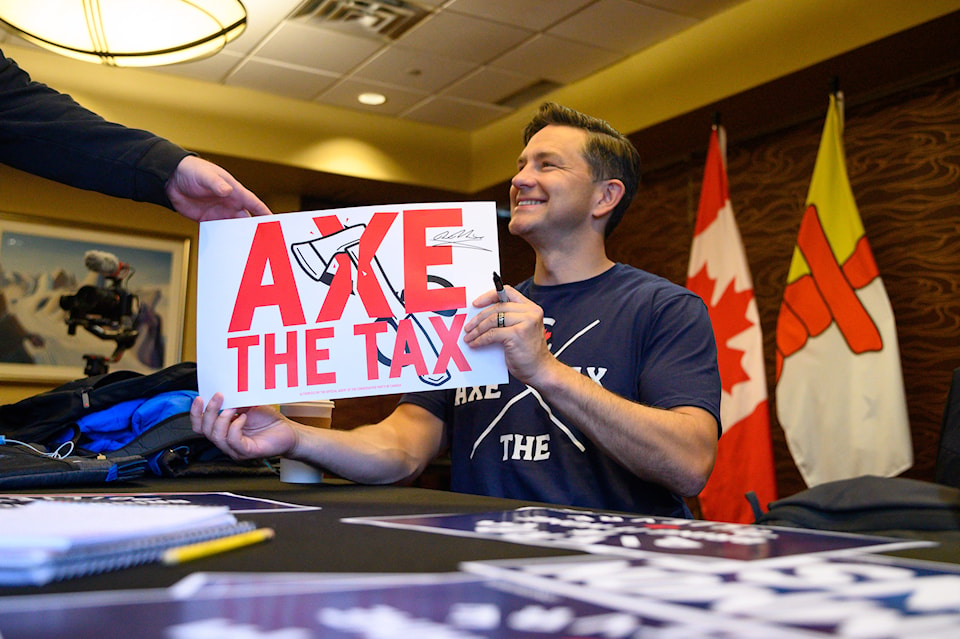The Conservative Party and its leader, Pierre Poilievre, are weaponizing the carbon tax in the current Canadian political landscape to the extent that it’s impossible to have rational, informed and honest conversations around this crucial climate policy.
Conservatives are the primary agents of disinformation about the carbon tax, misleading and diverting public attention through lies that hide the real causes of high prices for everyday goods.
Carbon pricing, generally called carbon tax, is a price set by governments on greenhouse gas emissions based on the carbon content of fossil fuels. The logic behind it is very straightforward: the more an emitter pollutes, the higher the tax’s cost.
It is designed to encourage industries, consumers and businesses to reduce their carbon footprint and switch to cleaner energy alternatives.
Poilievre is likely to become Canada’s next prime minister mainly thanks to his ability to capitalize on general discontent about the cost of living and inflation, having put the “axe the tax” mantra against the federal carbon tax at the forefront of his electoral campaign a year ago.
In his simplistic vision, the carbon tax is sold to Canadians as the root of all evil, and he declared the next federal election as “the next carbon tax election.”
To set the record straight, one simple fact should be established: the carbon tax is not the main culprit driving inflation.
Economists worldwide have been declaring for some time now that the leading causes are disruptions in the supply chain and a high rebounded demand by households for goods that weren’t available during the pandemic.
Climate change is also among the main reasons driving up prices, impacting the volume of the food produced and making the presence of crop diseases more likely.
Canada’s Food Price Report 2025 published by the Agri-Food Analytics Lab found food prices will increase by three per cent to five per cent next year from the current rate of 2.8 per cent. A family of four might spend more than $16,000 on groceries in 2025, an increase of up to $801 from 2024.
Carbon pricing is just trying to fight the worsening climate crisis so communities won’t have to spend more money and resources to develop further costly strategies in the future.
Bank of Canada Governor Tiff Macklem put a number on the inflation percentage points credited to the carbon tax during a question time after a luncheon address to the Calgary Chamber of Commerce in September last year.
His figure? A tiny 0.15 per cent, meaning that with inflation currently around three per cent, the carbon tax contributes to approximately one-twentieth of the price hikes. During last year's peak inflation of just over eight per cent, the carbon tax would have been responsible for about one-fifty-fourth of that increase.
Are these the numbers Poilievre is worried about?
This has not stopped the empty rhetoric of Conservatives, who in a post on the PC website cherry-picked the data reported by the Parliamentary Budget Office on the public benefit of the carbon tax and cited a report conducted by the Fraser Institute, a climate change-denial organization.
The complexity of the issue does not play in favour of the carbon tax, lending to misunderstandings, extreme simplifications and, therefore, political exploitation.
However, if nothing else, two elements remain central to assessing the benefits of the carbon tax: the financial returns to Canadians and its efficacy in creating a low-emission economy.
Despite the fuel charge added 17.6 cents to the price of gasoline in 2024 — around three cents more than in the previous year — 80 per cent of Canadian households get more money back than they pay at the pump thanks to a progressive carbon rebate, with the wealthiest Canadians paying more overall and the low-income families paying less.
The Canadian government uses a rebate estimator that shows how much individuals can get back depending on where they live and their family situation.
According to the Canadian Climate Institute, industrial carbon pricing will be more effective in cutting Canada’s emissions than any other climate policy between this year and 2030, cutting between 23 and 39 per cent of avoided emissions from all policies implemented to date.
Could the Conservatives kindly explain why Canadians should forgo easy money and viable solutions to the climate crisis that is endangering human lives?
This question could also be posed to Ontario Liberal Leader Bonnie Crombie who recently distanced herself from her federal counterpart's carbon tax policy.
It looks like the carbon tax has become the perfect scapegoat for those politicians who pretend to be on the side of the people.
Numerous economists across Canada have signed an open letter signalling their concern about a lack of a healthy public debate around carbon pricing and refuting most of the disinformation and the myths around it.
If Conservatives have better options than the carbon tax to fight the climate crisis, Canadians will be more than happy to hear them.
But that won't happen as Poilievre has no clue how to fight climate change, preferring to paddle into disinformation to confuse the population to control the narrative around climate policies.
This attitude will put people's lives in danger when he becomes prime minister. It's time for Canadians to stop being fooled and call Poilievre's lies for what they are: political crap for personal gain.



